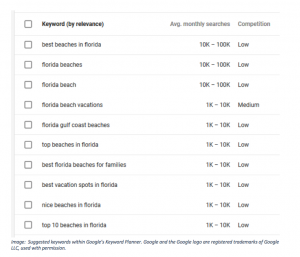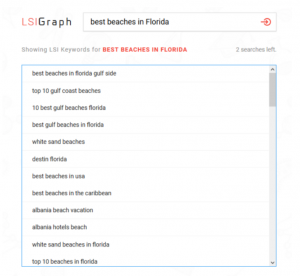Using latent semantic indexing (LSI) keywords – terms and phrases that are similar or related to the target keyword of a webpage – in that page’s content can be highly, highly advantageous to your SEO results.
That is, if you know how to find them. The rise of semantic search, employed by search engines in their efforts to achieve a more accurate and contextual understanding of an information searcher’s true intent, has altered SEO such that marketers ought to now optimize keywords for a page’s topic, not just its target phrase.
Here are four techniques that can help you discover appropriate LSI keywords for your website content and how to reap their benefits:
1) LSI keywords are more than just synonyms
In determining your LSI keywords, you need to maintain an expansive view of your target keyword’s topic; do not simply plug in other words that mean more or less the same thing. For instance, a page targeting “best beaches in Florida” shouldn’t just utilize synonym-based LSI keywords like “best coast in Florida” and “best shore in Florida,” but should also use terms that describe the subject more conceptually, i.e. “Florida beach vacations,” or “Florida water getaways.”
2) Investigate other Google searches related to your topic
When searching for LSI keywords well-suited for a page’s goal, basic Google searches are full of strong suggestions. Do a Google search for your target keyword – the bottom of the search results page will usually yield a slew of related searches that effectively tell you what Google considers to be relevant to the topic. This allows you to crowdsource LSI keywords to use, based on real search phrases.
Image: Google and the Google logo are registered trademarks of Google LLC, used with permission.
Another valuable keyword discovery strategy is to view the other strings that appear in Google’s search bar as you type in your target.
Image: Google and the Google logo are registered trademarks of Google LLC, used with permission.
Much like a semantic keyword tool, these readily available Google search results can yield highly useful suggestions that you may not come up with on your own. And you can get them for free and within seconds.
3) Find LSI keywords with Google’s Keyword Planner tool
Going a step deeper, Google also provides the Keyword Planner as a free tool built to help web marketers identify appropriate keywords (that can also assist in optimizing ad spend). This tool lends itself to determining LSI keywords: it can suggest hundreds of keywords relevant to a website, along with commonly related terms and phrases that are being actively used in Google queries.
Beyond finding LSI keywords, the fact that Keyword Planner identifies SEO keywords with high traffic and low competition enables web marketers to shape their LSI strategies wisely. In this way, they can target content around those LSI keywords that will provide the most bang for their buck.
Image: Suggested keywords within Google’s Keyword Planner. Google and the Google logo are registered trademarks of Google LLC, used with permission.
4) Use the LSIGraph tool
Another free tool, LSIGraph is specifically designed to generate LSI keywords that complement your existing page content. Web marketers and content producers simply need to enter a target keyword into the tool on the LSIGraph site to receive a rather robust list of LSI keywords to potentially utilize, like so:
A word of warning: with so many LSI keywords to choose from, it becomes important to resist the urge to overdo it and use too many for a single piece of content. Doing so risks engaging in keyword stuffing – the practice of over using keywords unnecessarily that can (and will) result in stiff search engine penalties and effectively negate a page’s positive SEO efforts. The better practice is to make use of select terms that are the most aligned with page content, while also maintaining a list of other promising keywords and developing new content, pages, and marketing materials to utilize those terms appropriately.
Remember that LSI keywords should be inserted into page content where they are a natural fit, in order to maximize the SEO benefits of your content strategy. By using these tools and techniques to identify the right LSI keywords and putting them to work, you can increase your content’s topic relevance, ultimately earning more traffic and winning more customers.
Kim Kosaka is the Director of Marketing at Alexa.com, whose tools provide insight into digital behavior that marketers use to better understand and win over their audience.
source https://searchenginewatch.com/4-specific-strategies-finding-LSI-keywords-boost-SEO




No comments:
Post a Comment